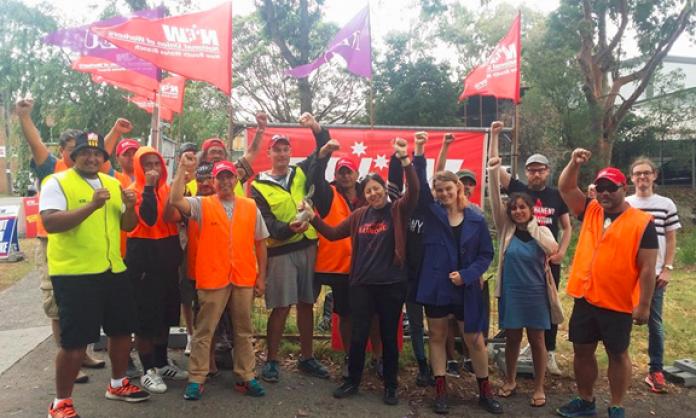After 17 days on strike, workers at Harrison Manufacturing, in Sydney’s Northern Beaches, are celebrating a hard-fought victory. As previously reported in Red Flag, the key issue of the strike was union representation. An increasingly nasty and bullying management was refusing to allow workers to be represented by delegates or officials of their union, the National Union of Workers (NUW).
Nine workers in the past five years have been sacked for non-existent or minor infringements, respect for the workforce was non-existent, and conditions in the factory and lunch-room are appalling. After holding out for two-and-a-half weeks, Harrison has now backed down and agreed to union representation. This should help the workers to begin improving the conditions at the site.
Peter, who has worked in the factory for 30 years, summed up the mood: “We can walk back in there with our heads held high. It’s a good feeling. When people are cornered they’ll fight back with anything they have. And that’s it. We’ll rebel. I’m very proud of the guys, to stand with them”.
Another worker, Shaun, said: “It feels fantastic, fighting for our rights. Stand up for your rights, no one else will”.
Other conditions were defended as well. The bosses wanted to reclassify some jobs and create new, unskilled entry-level positions. These would have been used to undermine the existing workforce and paved the way for casualisation. Not anymore.
Harrison had offered an insulting 1 percent pay rise per year. The workers will now receive 9 percent over four years. This is hardly generous, but clearly better than if the workers hadn’t put up a fight. They have also won a guarantee that no worker will be vilified for participating in the strike.
How they won
This strike was won through determination, solidarity, picketing and the workers understanding that they had the power to bring Harrison to its knees. From the very beginning, they decided on an indefinite strike, with a 24/7 picket line, until they won. One worker, Esafe, said: “We just stood our ground on what we agreed on, not letting them have access to transport to bring in packaging, and take product out”.
Despite employing only 22 workers in the factory, Harrison has a weekly turnover of $3-4 million, and supplies specially made grease and lubricants to Caltex, Valvoline, BP Castrol and mining projects across Australia. The work is skilled, making it harder for the bosses to find scab labour. This meant if the workers could maintain their strike, they had a good chance of victory.
The most testing moment came on 29 November when Harrison management co-ordinated with a trucking company, Warringah, and the police to violently smash the picket at 10pm and get nine trucks in. The police broke the leg of 25-year-old student, and Socialist Alternative member, Gene Brownlie, who was there to support the workers. As Esafe described: “They were brutal. They didn’t approach us in a peaceful way, just batons first. They used violence first”.
But the despicable actions of the company and the police that night only served to stiffen the resolve of the striking Harrison workers. The bosses managed to move some product – but without the staff to produce more, it was only a matter of time before the losses would begin to mount.
Solidarity
The strike enjoyed an inspiring display of solidarity from many quarters. First, among the workers themselves: 20 out of 22 went on strike and never wavered in their commitment to stay united. The strike has only strengthened this sentiment. One worker, Jose-Luis Diaz, said of the experience, “We get closer, we learn more about every individual, more than when we were inside. If you stand together, it’s the best way to do. Encourage other people to do the same”.
One contractor who had worked at Harrison for 20 years quit in protest the day after the police broke the picket line. Others who the bosses tried to hire as strike breakers refused to be used as scabs. Many truck drivers refused to cross the picket line. Workers from neighbouring factories and warehouses joined the picket, donated and told their own stories of workplace struggles. All day and night passing cars honked in support.
As one worker put it, “We’ve created a revolution in the Northern Beaches”. A remarkable feat for Tony Abbott’s electorate!
Most of the workers were from Tongan and other Islander backgrounds, and support from their family and communities poured in throughout the strike, with gatherings that raised morale and hundreds of dollars for the workers.
Socialist Alternative played a part in mobilising numbers on the picket line, helping to raise awareness about the strike, raising money to support the workers and getting other organisations to do likewise.
Community Action Against Homophobia visited the picket, along with representatives from the National Union of Students and the Sydney University and UNSW student unions.
The MUA, AMWU, and AWU all showed support, as did members of Socialist Alternative from the NTEU, CFMEU, PSA, NUW, ASU and Teachers Federation who visited the picket.
NUW members at the big Polar Fresh distribution centre in Victoria, who had their own explosive and successful three-day strike earlier this year, sent messages of solidarity.
“Every time you guys turned up it gave us courage to keep going”, said Esafe. “Fight for your rights. There’s a lot of support in the community. You may think you’re the only one, there’s support out there but you need to reach out, you’ll be surprised. Fight for it.”
This strike was an impressive display of the galvanising effect of struggle on those who participate in it. Peter, the oldest worker in the factory, put it best: “This was all new for us. Now if we see any picket line, we’ll be in it. We’re pros now. It’s not one union, it’s all unions together. We’re not alone now”.










